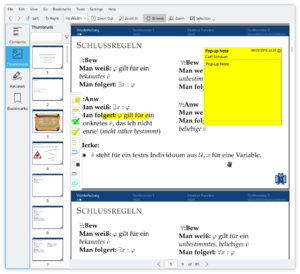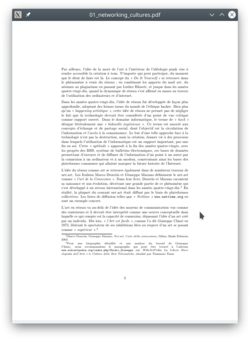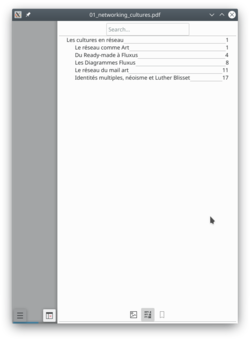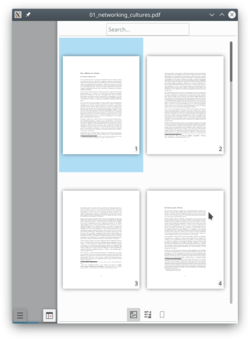Okular/es: Difference between revisions
(Updating to match new version of source page) |
(Updating to match new version of source page) |
||
| Line 20: | Line 20: | ||
Puedes hablar con los desarrolladores y otros usuarios usando IRC, en irc.freenode.org, canal [irc://irc.kde.org/#okular #okular]. | Puedes hablar con los desarrolladores y otros usuarios usando IRC, en irc.freenode.org, canal [irc://irc.kde.org/#okular #okular]. | ||
If you are interested in contributing to '''Okular''', please [ | If you are interested in contributing to '''Okular''', please [https://okular.kde.org/contact.php contact the team]. Programmers and non-coders are welcome all the same. | ||
== Mobile Version == | == Mobile Version == | ||
Okular has a mobile version since version 0.16 release in February 2013 <ref>[https://okular.kde.org/news.php Release information]</ref>. The first version was based on the [https://community.kde.org/Plasma/Active active] framework. The mobile viewer was then ported to Kirigami in 2016 by Marco Martin<ref>[https://phabricator.kde.org/R223:eb1f73800e83b11e4a5ae93ac069893aa88f0eaa | Okular has a mobile version since version 0.16 release in February 2013 <ref>[https://okular.kde.org/news.php Release information]</ref>. The first version was based on the [https://community.kde.org/Plasma/Active active] framework. The mobile viewer was then ported to Kirigami in 2016 by Marco Martin<ref>[https://phabricator.kde.org/R223:eb1f73800e83b11e4a5ae93ac069893aa88f0eaa Commit port mobile version from plasma-framework to kirigami]</ref> and finally to Kirigami2 in 2017<ref>[https://phabricator.kde.org/R223:caf8820cf773316ce41d9a8c1f7357b3ffc3ef86 Commit port mobile version from kirigami to kirigami2]</ref>. | ||
The mobile version doesn't support all features | The mobile version doesn't support all features from the desktop version, but provide better touch support and a mobile interface. | ||
[[File:Okular_mobile_pdf_view.png|250px]] | [[File:Okular_mobile_pdf_view.png|250px]] | ||
| Line 38: | Line 38: | ||
=== Reviewing Documents / Annotations === | === Reviewing Documents / Annotations === | ||
Double clicking on either one of the '''Review''' tools (<keycap>F6</keycap>) allows you to make multiple annotations without having to reactivate the tool after the first time. | Double-clicking on either one of the '''Review''' tools (<keycap>F6</keycap>) allows you to make multiple annotations without having to reactivate the tool after the first time. | ||
How to keep the annotations you made to the PDF file: | How to keep the annotations you made to the PDF file: | ||
| Line 49: | Line 49: | ||
By default, Okular follow the PDF specification and don't allow copying text from DRM protected files. However, there is an option in the settings to disable DRM limitations in <menuchoice>Settings -> General -> Program Features -> Obey DRM limitations</menuchoice> | By default, Okular follow the PDF specification and don't allow copying text from DRM protected files. However, there is an option in the settings to disable DRM limitations in <menuchoice>Settings -> General -> Program Features -> Obey DRM limitations</menuchoice> | ||
There was a small controversy in the Debian bug tracker a long time ago, about the default choice to Obey DRM limitations<ref>[https://lists.debian.org/debian-devel/2009/05/msg00879.html DRM and Okular in Debian bug tracker]</ref><ref>[https://lwn.net/Articles/335415/ DRM and Okular in LWM]</ref>. | There was a small controversy in the Debian bug tracker a long time ago, about the default choice to Obey DRM limitations<ref>[https://lists.debian.org/debian-devel/2009/05/msg00879.html DRM and Okular in Debian bug tracker]</ref><ref>[https://lwn.net/Articles/335415/ DRM and Okular in LWM]</ref>. The choice was then [https://tsdgeos.blogspot.com/2009/06/okular-pdf-and-drm.html explained] by an Okular/KPdf developer<ref>[https://tsdgeos.blogspot.com/2009/06/okular-pdf-and-drm.html Okular, PDF and file permissions]</ref>. | ||
=== PDF Signature and certificate === | === PDF Signature and certificate === | ||
Okular can verify if a PDF certificate is valid. But you can not yet create new signature. See [https://tsdgeos.blogspot.com/2019/01/okular-pdf-signature-certificate.html release note] for more information. | Okular can verify if a PDF certificate is valid. But you can not yet create a new signature. See [https://tsdgeos.blogspot.com/2019/01/okular-pdf-signature-certificate.html release note] for more information. | ||
== More Information == | == More Information == | ||
Revision as of 21:00, 3 February 2019
¿Qué es Okular?
Okular is a universal document viewer developed by KDE. Okular works on multiple platforms, including but not limited to Linux, Windows, Mac OS X, *BSD, etc.
Puedes seguir el desarrollo en la página web del proyecto.
Antecedentes
El desarrollo comenzó como parte del programa Google's Summer of Code. La descripción del proyecto se encuentra enKDE Developer's Corner.
Okular combines the excellent functionalities of KPDF with the versatility of supporting different kinds of documents, like PDF, Postscript, DjVu, CHM, and others.
La página de formatos compatibles tiene un cuadro que describe con más detalle los formatos compatibles y las características aplicables a cada uno de ellos.

Además de trabajar con muchos formatos, Okular ofrece características como selección de texto, anotaciones, extracción de archivos incrustados en documentos, y muchas otras sorpresas. Puedes ver imágenes de Okular en acción aquí.
Puedes hablar con los desarrolladores y otros usuarios usando IRC, en irc.freenode.org, canal #okular.
If you are interested in contributing to Okular, please contact the team. Programmers and non-coders are welcome all the same.
Mobile Version
Okular has a mobile version since version 0.16 release in February 2013 [1]. The first version was based on the active framework. The mobile viewer was then ported to Kirigami in 2016 by Marco Martin[2] and finally to Kirigami2 in 2017[3].
The mobile version doesn't support all features from the desktop version, but provide better touch support and a mobile interface.
You can test the mobile version in your PC by entering
okularkirigami
in your terminal.
Consejos y trucos
Reviewing Documents / Annotations
Double-clicking on either one of the Review tools (F6) allows you to make multiple annotations without having to reactivate the tool after the first time.
How to keep the annotations you made to the PDF file:
By default, Okular saves annotations in the local data directory for each user. Since KDE 4.9, it's optionally possible to store them directly in a PDF file by choosing , so they can be seen in other PDF viewers. Note that this feature requires Poppler 0.20 or newer for regular PDF documents. If the PDF document you are annotating is encrypted, this feature requires Poppler 0.22 or newer.
DRM
By default, Okular follow the PDF specification and don't allow copying text from DRM protected files. However, there is an option in the settings to disable DRM limitations in
There was a small controversy in the Debian bug tracker a long time ago, about the default choice to Obey DRM limitations[4][5]. The choice was then explained by an Okular/KPdf developer[6].
PDF Signature and certificate
Okular can verify if a PDF certificate is valid. But you can not yet create a new signature. See release note for more information.
More Information
- Official KDE documentation
- Okular website
- Okular API documentation
- Okular phabricator project
- Okular git repository



